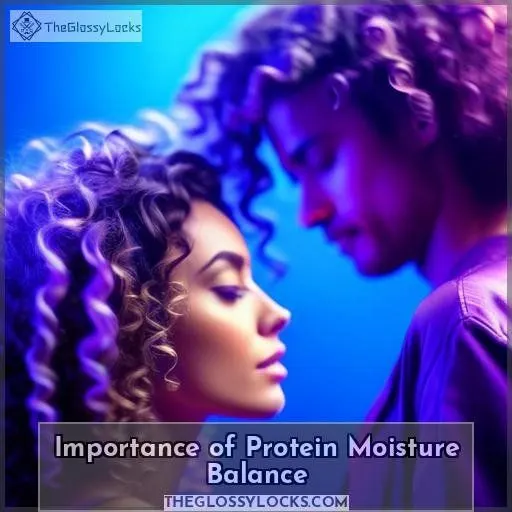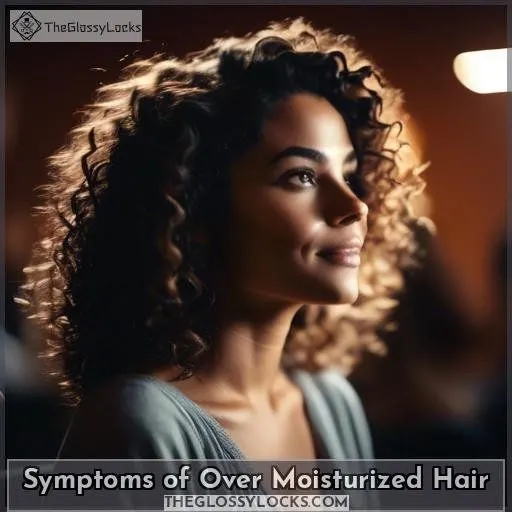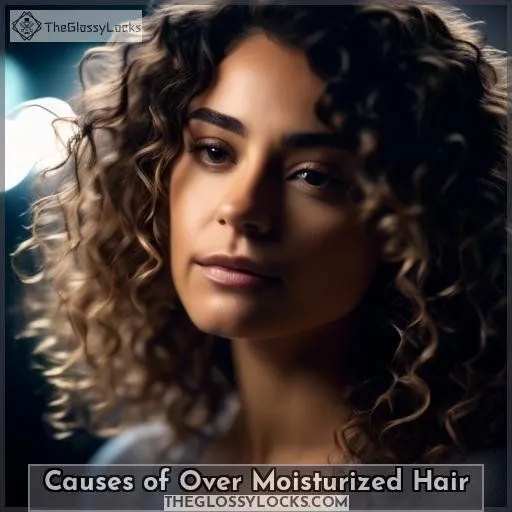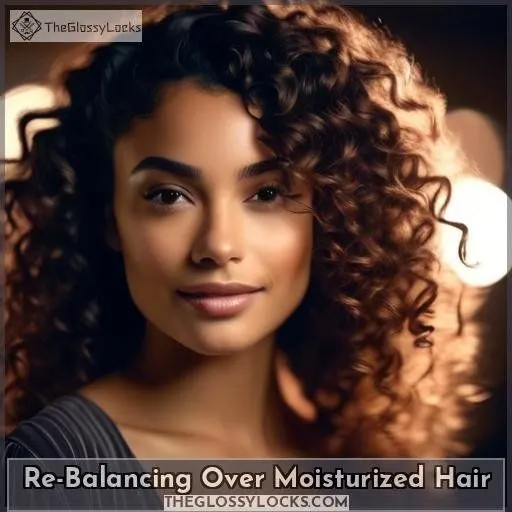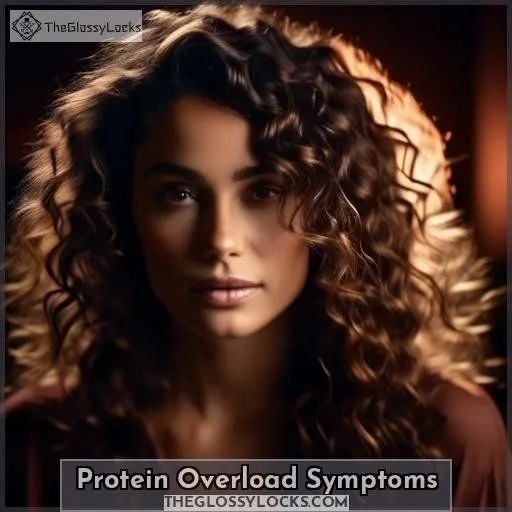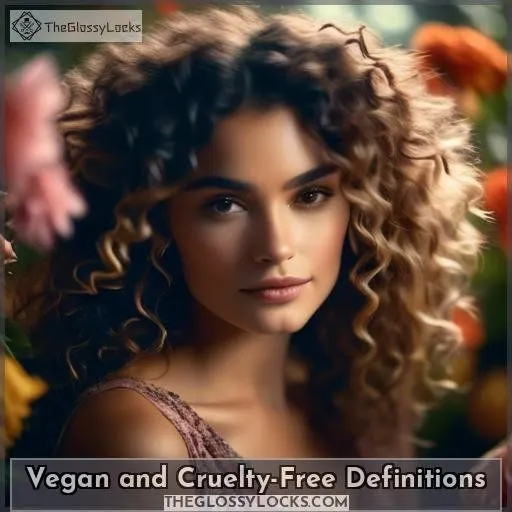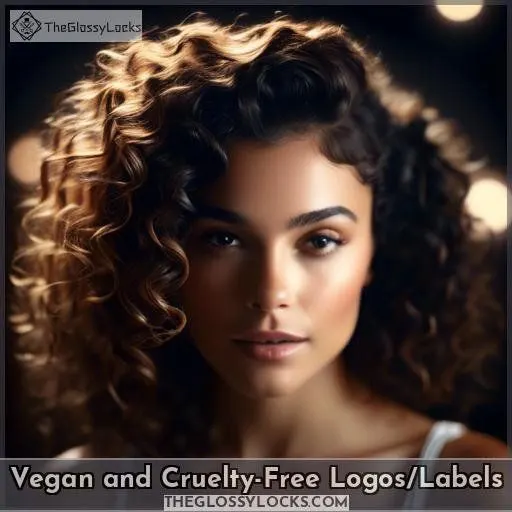This site is supported by our readers. We may earn a commission, at no cost to you, if you purchase through links.
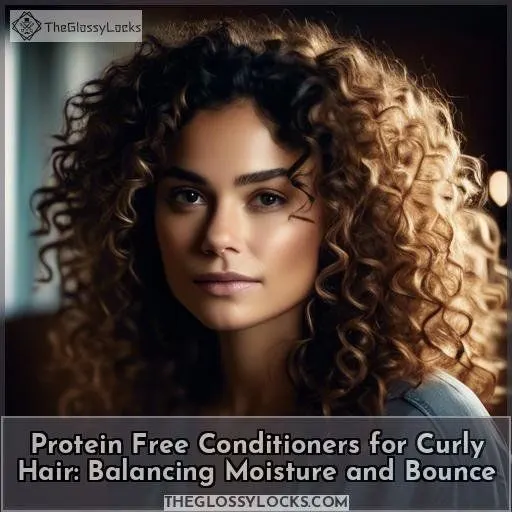
You need protein-free conditioners for curly hair to restore limp, lifeless curls caused by over-moisturization.
Excessive use of leave-ins, masks, and oils can create a moisture-protein imbalance, leading to stretchy, soft strands that struggle to hold their shape.
Protein-free conditioners replenish hydration without adding more protein, allowing you to re-balance moisture levels.
By incorporating clarifying shampoos and protein-free products into your routine, you’ll revive your curls’ natural bounce and spring.
Want to discover more tips for achieving perfect protein-moisture harmony?
Table Of Contents
- Key Takeaways
- Why You Need Protein Free Conditioners for Curly Hair?
- Importance of Protein Moisture Balance
- Symptoms of Over Moisturized Hair
- Causes of Over Moisturized Hair
- Re-Balancing Over Moisturized Hair
- Protein Overload Symptoms
- Vegan and Cruelty-Free Definitions
- Vegan and Cruelty-Free Logos/Labels
- Frequently Asked Questions (FAQs)
- Conclusion
Key Takeaways
- Protein-free conditioners are essential for maintaining the delicate balance between moisture and protein in curly hair, ensuring your curls remain vibrant and full of life.
- Over-moisturization can lead to limp, lifeless curls that struggle to hold their shape, and protein-free conditioners can help restore resilience and prevent breakage.
- To prevent lifeless texture, opt for protein-free conditioners that focus on detangling, frizz control, and curl definition, helping maintain moisture balance without the risk of protein overload.
- Incorporating protein-infused products into your hair care regimen, such as protein treatments or protein-enriched shampoos and conditioners, can help achieve the optimal balance between protein and moisture.
Why You Need Protein Free Conditioners for Curly Hair?
Protein-free conditioners are essential for curly hair because overuse of protein can lead to dryness, stiffness, and breakage. Curly hair tends to be more porous and prone to protein overload, which can result in hair that feels dry and brittle. Protein-free conditioners help to maintain the moisture balance in curly hair, ensuring it remains soft, defined, and bouncy. By avoiding protein-rich conditioners, you can prevent your hair from becoming overly stiff and brittle, allowing it to retain its natural texture and elasticity.
Importance of Protein Moisture Balance
Maintaining the health of your curly hair hinges on striking a harmonious balance between protein and moisture.
Protein fortifies and structures, while moisture imparts hydration and suppleness.
When these elements are in equilibrium, your curls will exhibit consistent definition and desirable outcomes.
However, an imbalance can invite challenges.
If your hair is protein-deficient, it may succumb to weakness and susceptibility to breakage.
Conversely, an overabundance of moisture can render curls limp and lifeless, making styling a daunting task.
To achieve the optimal balance, consider incorporating protein-infused products into your hair care regimen, such as protein treatments or protein-enriched shampoos and conditioners.
Additionally, be cognizant of your hair’s distinct needs, as each individual’s hair possesses unique characteristics and may require varying levels of protein and moisture.
Symptoms of Over Moisturized Hair
You might notice your curls are limp, lifeless, and struggle to retain their shape – this signals over-moisturized hair from an imbalance of moisture and protein. When curls stretch excessively without quickly springing back or appear unnaturally soft and limp, it’s time to incorporate protein-rich products to restore strength and bounce.
Limp Curls Restoration
If your curls are limp and lacking definition, it’s likely that your hair is overmoisturized.
This can lead to breakage and a lack of resilience, which are essential for healthy shine and curl definition.
To restore balance, consider using protein-free conditioners that focus on moisture retention.
These products can help restore resilience and prevent breakage, ensuring your curls bounce back with a healthy shine.
Reducing Excessive Stretch
Just bounced back from limp curls? Now, let’s tackle that excessive stretch that’s been plaguing your bouncy dreams. Here’s a quick fix:
- Dial back on the deep conditioning; your locks are thirsty, not parched.
- Introduce a protein-free mask to your routine for texture restoration without the overload.
- Swap in a clarifying shampoo to nix that excessive wetness.
- Remember, balanced curls need a protein moisture balance, not a deluge!
Preventing Lifeless Texture
Over conditioning can lead to lifeless curls.
To prevent this, opt for protein-free conditioners that focus on detangling, frizz control, and curl definition.
These conditioners help maintain moisture balance without the risk of protein overload.
By incorporating them into your hair care routine, you’ll enjoy healthy, bouncy curls without the fear of moisture overload or breakage.
Protein-free conditioners for curly hair are essential for maintaining the delicate balance between moisture and protein, ensuring your curls remain vibrant and full of life.
Causes of Over Moisturized Hair
You can end up with over-moisturized hair by overdoing it with moisture-based products like leave-in conditioners, deep conditioners, and oils/butters. This protein-moisture imbalance leads to limp, lifeless curls that struggle to hold their shape because there isn’t enough protein to provide structure and strength.
Over moisturization and protein imbalance
Over moisturization and protein imbalance can lead to hair breakage, curl definition loss, and scalp health issues. To avoid these problems, consider the following tips:
- Reduce excessive conditioning: Overuse of conditioners can weigh down curls and lead to protein imbalance.
- Balance moisture and bounce: Use protein-free conditioners to maintain moisture without overloading your curls with protein.
- Adopt styling techniques: Opt for plopping or plunking to dry curly hair and give it extra volume.
Importance of protein moisture balance
Protein and moisture are vital for preserving the health of curly tresses.
Protein imparts vigor and form, while moisture bestows hydration and suppleness.
Striking an equilibrium between these elements is paramount in attaining consistent curls and achieving the desired aesthetic.
Nevertheless, an excess of moisture can culminate in over-hydrated hair, manifesting in symptoms such as diminished curl definition, absence of dryness, and impaired curl retention.
To restore balance to over-moisturized hair, consider incorporating protein-infused products, reducing the frequency of washing, and adopting gentle drying methods.
Symptoms of over moisturized hair
Over moisturized hair can lead to limp curls, excessive stretch, and a lifeless texture.
This can be caused by a lack of protein in your hair care routine, hygral fatigue, or excessive deep conditioning.
To rebalance your hair, consider using a protein-rich treatment, reducing wash frequency, and being mindful of the moisture balance in your products.
Re-Balancing Over Moisturized Hair
After diving into the causes of over-moisturized hair, it’s clear that a shift in your hair care routine is essential.
Start by introducing clarifying shampoos into your regimen. These are your secret weapon, cutting through the gunk without stripping your strands.
Next, dial back on the wash frequency. Your hair isn’t a dish; it doesn’t need daily scrubbing.
Embrace the art of squeezing excess water with the gentleness of a first date handshake.
Now, let’s talk protein—your hair’s new best friend. Opt for protein-containing products and treatments that whisper strength into each strand.
With silicone-free conditioners, you’re not just balancing moisture; you’re championing hair health with every wash.
Protein Overload Symptoms
Just as over-moisturizing your curly tresses can lead to limp, lifeless locks, an excess of protein can wreak havoc, leaving you with brittle, easily snapping hair that refuses to retain moisture.
From a dull, frizzy appearance to a dry, wiry, straw-like texture, the signs of protein overload are unmistakable.
Making it crucial to strike the right balance and reach for protein-free conditioners when needed.
Protein Overload Symptoms
Protein overload can occur when your hair is exposed to too much protein or when your hair is not getting enough moisture.
Symptoms of protein overload include brittle hair that easily snaps, a dull and frizzy appearance, a dry, wiry, straw-like texture, difficulty absorbing moisture, and a tendency for looser curl patterns.
To rebalance your hair, consider using a clarifying shampoo, reducing wash frequency, squeezing excess water out of your hair, avoiding protein-containing products, and avoiding protein treatments.
Protein Overload Causes
Protein overload can cause hair damage, leading to frizz and brittleness.
This can be caused by excessive use of thermal heat caps, harsh hair care products, or lack of protein balance in your hair care routine.
To prevent protein overload, consider using vegan and cruelty-free hair products that contain proteins.
Avoid using heavy oils or butters.
Regular protein treatments and reducing wash frequency can also help maintain a healthy protein moisture balance.
Protein Overload Treatment
When hair is over moisturized, it can lead to limp curls, excessive stretch before snapping, and a lifeless texture.
This is often caused by a protein imbalance, which can result in protein overload.
Symptoms of protein overload include brittle, easily snapping hair, a dull, frizzy appearance, and a dry, wiry, straw-like texture.
To rebalance over moisturized hair, consider using a clarifying shampoo, reducing wash frequency, squeezing excess water, and incorporating protein-containing products or treatments.
For those with protein overload, focus on restoring balance with protein-rich ingredients and avoiding heavy oils or butters.
Vegan hair, face, and body products can help maintain the right balance for curly hair.
Vegan and Cruelty-Free Definitions
As you journey deeper into the realm of vegan and animal-friendly beauty products, it’s imperative to grasp the definitions behind these terms. Vegan products exclude any animal or animal-derived ingredients, while animal-friendly products haven’t been subjected to animal testing. Both concepts are pivotal for consumers seeking to align their beauty practices with their ethical values and environmental concerns.
Here are three fundamental points to bear in mind about vegan and animal-friendly beauty products:
- Vegan Products: These are crafted without any animal or animal-derived ingredients. Examples include plant-based components such as jojoba oil, aloe vera extract, and avocado butter. Vegan skincare often utilizes natural plant-based ingredients that nourish the skin without synthetic chemicals or preservatives.
- Animal-Friendly Products: These aren’t tested on animals, including by the product manufacturer or third parties involved in the production process. Animal-friendly brands typically employ alternative methods for safety testing, such as patch tests and computer simulations.
- Vegan vs. Animal-Friendly: While vegan skincare products are often animal-friendly, it’s possible for a product to be vegan but not animal-friendly, or vice versa. Some companies may test their formulations on animals or use animal products in their production process, even if the formulas themselves are vegan.
Vegan and Cruelty-Free Logos/Labels
Venturing into the realm of vegan and cruelty-free hair care is akin to deciphering an enigmatic code.
But fret not! The key to unraveling this enigma lies in comprehending the emblems and labels.
Vegan accreditation guarantees that you’re acquiring products devoid of even a trace of animal ingredients or experimentation.
Conversely, cruelty-free certification confirms that no creatures were subjected to testing, although these products may still contain ingredients derived from animals.
The Leaping Bunny, PETA, and CCF symbols serve as your steadfast beacons, illuminating ethical options.
Choosing products adorned with these insignia not only indulges your tresses but also aligns with your unwavering stance against animal cruelty. It’s a victory for both you and the creatures you seek to protect.
So, the next time you embark on a quest for hair care, allow these logos to guide you towards curls that are as guilt-free as they are glorious.
Frequently Asked Questions (FAQs)
What causes protein overload in curly hair?
You’ll experience protein overload when using too many protein-rich products. Curls become dry, brittle and prone to breakage since protein builds up, making it hard for your hair to absorb moisture. Moderation is key – mix protein and moisture for beautiful, defined curls.
How often should you wash and condition curly hair?
You’ll want to wash curly hair 1-2 times per week max. Overwashing strips essential oils, leading to dryness and frizz. Condition every time, rinsing with cool water to seal the cuticle. Finding your hair’s sweet spot takes some trial and error, but it’s so worth it for defined, bouncy curls!
What are the best protein-free conditioners for curly hair?
You’ll want to try DevaCurl One Condition® Decadence or As I Am Coconut Cowash. They’re protein-free, so your curls stay soft and defined without getting that dry, brittle look from too much protein. Trust me, your gorgeous spirals will thank you!
Can you use protein treatments on over-moisturized hair?
While over-moisturized hair cries out for protein like a wilting flower for sunlight, dousing it with treatments may shock your strands into further rebellion. A gentler approach—swapping in protein-enriched products gradually—can restore curl integrity without causing more damage.
How can you tell if your hair is protein-sensitive?
You may be protein-sensitive if your hair feels dry, brittle, and snaps easily after using protein products. Pay attention to how your curls react – if they become dull, frizzy, or limp, you’ll want to avoid or limit protein.
Conclusion
Curly strands thrive on balance, like a well-choreographed dance. By embracing protein-free conditioners, you’ll restore your curls’ rhythm and bounce, preventing limp locks from over-moisturization. Clarifying shampoos and a curated routine will harmonize hydration and structure, allowing your natural texture to shine. Discover why you need protein-free conditioners to revive lifeless curls and achieve moisture-protein equilibrium.

